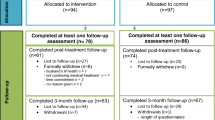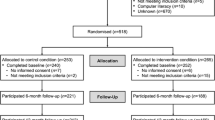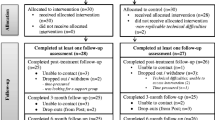Abstract
Purpose
The present analysis explores whether demographic, psychosocial, or intervention adherence factors moderated treatment efficacy of Finding My Way (FMW), an efficacious self-directed web-based psychosocial program for newly diagnosed curatively treated cancer patients.
Methods
Participants (n = 191) completed a 6-module intervention (n = 94) or attention-control (n = 97) program. Outcome measures were completed at baseline (T0), post-program (T1), 3-month (T2), and 6-month (T3) follow ups. Age, gender, social support, information processing style (monitoring vs blunting), emotion-regulation difficulties, and intervention adherence were examined as potential moderators.
Results
Age moderated emotional functioning and general distress at T3 with significant intervention benefits only observed in younger participants; age moderated cognitive functioning at T1, with intervention benefits only found in older participants. Gender moderated helplessness/hopelessness, emotional functioning, and cognitive avoidance at T1 with men benefitting more from receiving the intervention vs control. Monitoring information-processing style moderated cancer distress and anxious preoccupation at T3: higher monitors benefitted more from receiving the intervention vs control. Program adherence moderated global QOL, emotional functioning and social functioning at T2 and T3; cognitive avoidance (T1), anxious preoccupation (T2) and role function (T3), with those who completed more of the program benefitting more if they received the intervention than control. Emotion dysregulation and social support each moderated role function at T2, with those more dysregulated and less socially supported benefitting more if they received the intervention than control.
Conclusions
For select outcomes, FMW is more effective for patients with specific characteristics; these findings can inform future tailoring and targeting of online programs for cancer-distress.

Similar content being viewed by others
References
Fridriksdottir N, Gunnarsdottir S, Zoega S, Ingadottir B, Hafsteinsdottir EJG (2018) Effects of web-based interventions on cancer patients’ symptoms: review of randomized trials. Support Care Cancer 26(2):337–351
McAlpine H, Joubert L, Martin-Sanchez F, Merolli M, Drummond KJ (2015) A systematic review of types and efficacy of online interventions for cancer patients. Patient Educ Couns 98(3):283–295
Bouma G (2015) Internet-based support programs to alleviate psychosocial and physical symptoms in cancer patients: a literature analysis. Crit Rev Oncol Hematol 95:26. https://doi.org/10.1016/j.critrevonc.2015.01.011
Beatty L, Koczwara B, Wade T (2016) Evaluating the efficacy of a self-guided Web-based CBT intervention for reducing cancer-distress: a randomised controlled trial. Support Care Cancer 24(3):1043–1051
Chambers SK, Ritterband LM, Thorndike F, Nielsen L, Aitken JF, Clutton S, Scuffham PA, Youl P, Morris B, Baade PD, Dunn J (2018) Web-delivered cognitive behavioral therapy for distressed cancer patients: randomized controlled trial. J Med Internet Res 20(1):e42
Urech C, Grossert A, Alder J, Scherer S, Handschin B, Kasenda B, Borislavova B, Degen S, Erb J, Faessler A, Gattlen L, Schibli S, Werndli C, Gaab J, Berger T, Zumbrunn T, Hess V (2018) Web-based stress management for newly diagnosed patients with cancer (STREAM): a randomized, wait-list controlled intervention study. J Clin Oncol 36(8):780–788. https://doi.org/10.1200/JCO.2017.74.8491
Beatty L, Kemp E, Coll JR, Turner J, Butow P, Milne D, Yates P, Lambert S, Wootten A, Yip D, Koczwara B (2019) Finding My Way: results of a multicentre RCT evaluating a web-based self-guided psychosocial intervention for newly diagnosed cancer survivors. Support Care Cancer 27(7):2533–2544. https://doi.org/10.1007/s00520-018-4526-1
Kalter J, Verdonck-de Leeuw IM, Sweegers MG, Aaronson NK, Jacobsen PB, Newton RU, Courneya KS, Aitken JF, Armes J, Arving C, Boersma LJ, Braamse AMJ, Brandberg Y, Chambers SK, Dekker J, Ell K, Ferguson RJ, Gielissen MFM, Glimelius B, Goedendorp MM, Graves KD, Heiney SP, Horne R, Hunter MS, Johansson B, Kimman ML, Knoop H, Meneses K, Northouse LL, Oldenburg HS, Prins JB, Savard J, van Beurden M, van den Berg SW, Brug J, Buffart LM (2018) Effects and moderators of psychosocial interventions on quality of life, and emotional and social function in patients with cancer: An individual patient data meta-analysis of 22 RCTs. Psychooncology 27(4):1150–1161. https://doi.org/10.1002/pon.4648
Faller H, Schuler M, Richard M, Heckl U, Weis J, Küffner R (2013) Effects of psycho-oncologic interventions on emotional distress and quality of life in adult patients with cancer: systematic review and meta-analysis. J Clin Oncol. https://doi.org/10.1200/jco.2011.40.8922
Heron-Speirs HA, Baken DM, Harvey ST (2012) Moderators of psycho-oncology therapy effectiveness: meta-analysis of socio-demographic and medical patient characteristics. Clin Psychol Sci Pract 19(4):402–416. https://doi.org/10.1111/cpsp.12010
Willems RA, Mesters I, Lechner L, Kanera IM, Bolman CAW (2017) Long-term effectiveness and moderators of a web-based tailored intervention for cancer survivors on social and emotional functioning, depression, and fatigue: randomized controlled trial. J Cancer Surviv 11(6):691–703
Heckman CJ, Handorf EA, Darlow SD, Ritterband LM, Manne SL (2017) An online skin cancer risk-reduction intervention for young adults: Mechanisms of effects. Health Psychol 36(3):215–225. https://doi.org/10.1037/hea0000420
Kornblith AB, Herndon JE, Zuckerman E, Viscoli CM, Horwitz RI, Cooper MR, Harris L, Tkaczuk KH, Perry MC, Budman D, Norton L, Holland JC (2001) Social support as a buffer to the psychological impact of stressful life events in women with breast cancer. Cancer 91:443–454
Vodermaier A, Linden W (2019) Social support buffers against anxiety and depressive symptoms in patients with cancer only if support is wanted: a large sample replication. Support Care Cancer 27(7):2345–2347. https://doi.org/10.1007/s00520-019-04737-w
Roussi P, Miller SM (2014) Monitoring style of coping with cancer related threats: a review of the literature. J Behav Med 37(5):931–954. https://doi.org/10.1007/s10865-014-9553-x
Vaughan E, Koczwara B, Kemp E, Freytag C, Tan W, Beatty L (2019) Exploring emotion regulation as a mediator of the relationship between resilience and distress in cancer. Psychooncology 28(7):1506–1512. https://doi.org/10.1002/pon.5107
Australian Bureau of Statistics (1991) 1989–1990 National health survey users’ guide. ABS. Cat No. 4363.0., Canberra
Bronner MB, Nguyen MH, Smets EMA, Ven AWH, Weert JCM (2018) Anxiety during cancer diagnosis: Examining the influence of monitoring coping style and treatment plan. Psychooncology 27(2):661–667. https://doi.org/10.1002/pon.4560
Beatty L, Kemp E, Wade T, Koczwara B (2015) Finding My Way: protocol of a randomised controlled trial evaluating an internet self-help program for cancer-related distress. BMC Cancer 15(1):328. https://doi.org/10.1186/s12885-015-1322-x
Foa EB, Riggs DS, Dancu CV, Rothbaum BO (1993) Reliability and validity of a brief instrument for assessing posttraumatic stress disorder. J Trauma Stress 6:459–473
Lovibond SH, Lovibond PH (1995) Manual for the depression anxiety stress scales (DASS). University of New South Wales, Sydney
Aaronson NK, Ahmedzai S, Bergman B, Bullinger M, Cull A, Duez NJ, Filiberti A, Flechter H, Fleishman SB, de Haes JCJM, Kaasa S, Klee M, Osobo D, Razavi D, Rofe PB, Schraub S, Sneeuw K, Sullivan M, Takeda F (1993) The European Organization for research and treatment of cancer QLQ-C30: A quality-of-life instrument for use in international clinical trials in oncology. J Natl Cancer Inst 85:365–376
Watson M, Law M, dos Santos M, Greer S, Baruch J, Bliss J (1994) The Mini-MAC: Further development of the Mental Adjustment to Cancer scale. J Psychosoc Oncol 12(3):33–46
Sherbourne CD, Stewart AL (1991) The MOS social support survey. Soc Sci Med 32(6):705–714
Miller SM (1987) Monitoring and blunting: Validation of a questionnaire to assess styles of information seeking under threat. J Pers Soc Psychol 52:345–353
Gratz KL, Roemer L (2004) Multidimensional assessment of emotion regulation and dysregulation: development, factor structure, and initial validation of the difficulties in emotion regulation scale. J Psychopathol Behav Assess 26(1):41–54. https://doi.org/10.1023/b:Joba.0000007455.08539.94
Beatty L, Kemp E, Binnion C, Turner J, Milne D, Butow P, Lambert S, Yates P, Yip D, Koczwara B (2017) Uptake and adherence to an online intervention for cancer-related distress: older age is not a barrier to adherence but may be a barrier to uptake. Support Care Cancer 25(6):1905–1914
Hamilton J, Kruse H, Holcomb L, Freche R (2018) Distress and psychosocial needs: demographic predictors of clinical distress after a diagnosis of cancer. Clin J Oncol Nurs 22(4):390
Pergolotti M, Battisti NML, Padgett L, Sleight AG, Abdallah M, Newman R, Van Dyk K, Covington KR, Williams GR, van den Bos F, Pollock Y, Salerno EA, Magnuson A, Gattás-Vernaglia IF, Ahles TA (2020) Embracing the complexity: Older adults with cancer-related cognitive decline-A Young International Society of Geriatric Oncology position paper. J Geriatr Oncol 11(2):237–243. https://doi.org/10.1016/j.jgo.2019.09.002
Altman M, Huang TT, Breland JY (2018) Design thinking in health care. Prev Chron Dise 15:E117. https://doi.org/10.5888/pcd15.180128
National Institute of Health and Care Guidelines (NICE) (2016) Community engagement: improving health and wellbeing and reducing health inequalities. NICE guideline [NG44]. https://www.nice.org.uk/guidance/ng44. Accessed 15 June 2021
Jackson SE, Chester JD (2015) Personalised cancer medicine. Int J Cancer 137(2):262–266. https://doi.org/10.1002/ijc.28940
Cuijpers P, Christensen H (2016) Are personalised treatments of adult depression finally within reach? Epidemiol Psychiatr Sci 26(1):40–42. https://doi.org/10.1017/S204579601600007X
Acknowledgements
This project was funded by the National Health & Medical Research Council (Grant No. 1042942). Dr Lisa Beatty is funded by a Cancer Council SA Fellowship. We would like to thank Dr Joseph Coll for conducting all the project’s statistical analyses, and our late colleague and co-investigator, Mr Paul Katris, for his invaluable support and input into the Finding My Way project. The Finding My Way authorship group includes: Professor Tracey Wade, Ms Caroline Richards, Mr Michael Fitzgerald, Professor Desmond Yip, Dr. Sarah McKinnon, Ms. Simone Noelker, Dr. Louise Gorman, Ms. Bernadette Zappa, Ms. Judy Allen, Ms. Sally Sara, Ms. Lisa Mackenzie, Mr. Edward Craft, Ms. Kathryn Stafford, Ms. Ruby Lipson-Smith, and Ms. Rose Kamateros.
Thank you to consumer representative Ms Julie Marker (Cancer Voices SA), who reviewed the concept outline/protocol, assisted with the intervention development phase, and provided input with recruitment throughout the study. We also thank Breast Cancer Network Australia and Register4, and their staff, for assistance with recruitment.
Thank you to the men and women who participated in this trial, we hope you found, and continue to find, the program helpful.
Author information
Authors and Affiliations
Corresponding author
Additional information
Publisher’s note
Springer Nature remains neutral with regard to jurisdictional claims in published maps and institutional affiliations.
Supplementary Information
Below is the link to the electronic supplementary material.
Rights and permissions
About this article
Cite this article
Beatty, L., Kemp, E., Turner, J. et al. Moderators of intervention efficacy for Finding My Way: A web-based psychosocial intervention for cancer-related distress. Support Care Cancer 29, 7669–7678 (2021). https://doi.org/10.1007/s00520-021-06291-w
Received:
Accepted:
Published:
Issue Date:
DOI: https://doi.org/10.1007/s00520-021-06291-w




